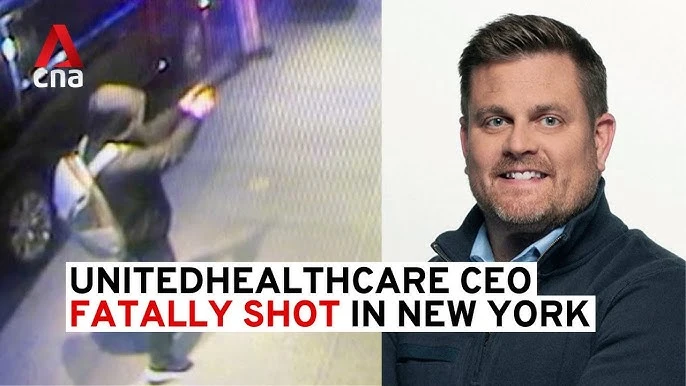Deny the Claim, Defend the Lawsuit Shooting of UnitedHealthcare CEO and the ‘Deny, Delay, Defend’ Tactics
On December 4, 2024, the tragic and highly unusual shooting of UnitedHealthcare CEO Brian Thompson in New York City shocked the healthcare industry and the public. While law enforcement officials are still piecing together the motive, investigators discovered an unsettling detail: the bullet casings at the scene were inscribed with the words “deny,” “defend,” and “depose.” These words echo a well-known phrase used to criticize the practices of insurance companies—particularly the tactics employed to avoid paying out claims. The phrase “Delay, Deny, Defend” has become a rallying cry for critics of the insurance industry, especially in healthcare.
This article explores the chilling connection between these words and the broader issues of insurance practices, the allegations against UnitedHealthcare, and the public’s growing frustration with insurers. We will delve into the meaning of these terms, how they relate to the case, the criticisms facing UnitedHealthcare, and recent updates, including a major lawsuit filed against the insurer.
Table of Contents
The Message on the Bullet Casings: ‘Deny,’ ‘Defend,’ and ‘Depose’
The discovery of “deny,” “defend,” and “depose” written on the bullet casings has raised eyebrows and fueled public speculation. These words are eerily similar to the widely used phrase “Delay, Deny, Defend,” which has been used to describe the practices of insurance companies, particularly those that delay payments on claims, deny claims altogether, or defend their actions in prolonged legal battles.
Expert Insight:
Lea Keller, a managing partner at Lewis and Keller law firm, noted, “The longer they can delay and deny the claim, the longer they can hold onto their money, which increases their profits, while patients suffer.”
This phrase was popularized by Jay Feinman’s 2010 book, Delay, Deny, Defend, which critically examines how insurers employ these tactics to limit payouts and maximize profits. The book explores the moral and financial implications of such strategies, arguing that they harm individuals by delaying necessary medical care or forcing claimants into lengthy litigation.

What Does ‘Delay, Deny, Defend’ Mean? How Does It Relate to UnitedHealthcare?
The phrase “Delay, Deny, Defend” describes a series of tactics often used by insurance companies to minimize financial losses by limiting their payouts. Insurers delay payment by dragging out the claims process, deny legitimate claims by citing technicalities or obscure policy language, and defend their actions by forcing claimants to litigate or appeal their denials. This strategy allows them to retain money for a longer period, increasing their profits and reducing their liability.
Expert Insight:
Dr. Mario Macis, an economist from Johns Hopkins University, explains, “The practice of denying claims, particularly for high-cost treatments, is viewed by many as a reflection of insurance companies prioritizing profits over patient care, which deepens the mistrust.”
UnitedHealthcare, one of the largest health insurers in the U.S., has faced increasing scrutiny for these very practices. In recent years, the company has been accused of deliberately denying coverage for essential services, particularly in cases of expensive treatments, surgeries, and therapies.
The Controversial Practices of UnitedHealthcare: Denial of Care and Algorithmic Decision Making
UnitedHealthcare’s refusal to cover certain treatments or services has been a point of contention for many patients and healthcare professionals. One of the most frequent complaints is the company’s use of prior authorization, which has been described as a roadblock to timely care.
Additionally, UnitedHealthcare has been criticized for its use of algorithms to determine which claims are denied. These algorithms, used by its subsidiary NaviHealth, can override medical professionals’ recommendations, leading to situations where patients are denied essential care. In some cases, the algorithmic decisions have resulted in severe patient harm, particularly in vulnerable populations like seniors enrolled in Medicare Advantage plans.
Statistics:
A 2023 ProPublica investigation found that UnitedHealthcare denied a significant portion of care recommended by doctors, particularly for seniors. In 2022, over 27% of claims for Medicare Advantage members were denied based on algorithmic decisions, a sharp increase from previous years.
Related Articles For You:
Hawk Tuah Lawsuit Hailey Welch’s $HAWK Coin – From Viral Fame to Crypto Controversy and Legal Fallout

Public Reactions: Social Media Outrage and Widespread Frustration
The shooting of Brian Thompson has caused a ripple of outrage, particularly on social media, where users have made connections between the attack and the widespread dissatisfaction with health insurers, particularly UnitedHealthcare. Many people took to platforms like Twitter and Instagram to express their frustrations, with some even making dark jokes about the situation.
Example Comments:
- “I would be happy to help look for the shooter, but vision isn’t covered under my healthcare plan.”
- “Thoughts and prior authorizations! #UnitedHealthcare”
While these comments reflect a deep frustration with insurers, they also show the level of public mistrust toward large health insurers who are seen as prioritizing profits over patient care.
The Lawsuit Against UnitedHealthcare: Latest Updates
As frustrations with UnitedHealthcare continue to mount, legal actions have followed. In October 2024, a significant lawsuit was filed against the insurer by a group of patients who allege that UnitedHealthcare wrongfully denied coverage for medically necessary treatments. The plaintiffs argue that the company’s denial of care was not only unjust but also put their health at risk.
In this high-profile case, the plaintiffs claim that UnitedHealthcare’s prior authorization process resulted in unnecessary delays in critical treatments, leading to deteriorating health and additional medical costs. The lawsuit has drawn attention to the insurer’s systemic denial practices and is expected to lead to further investigations into UnitedHealthcare’s claims handling procedures.
Expert Insight:
“This lawsuit could serve as a wake-up call for the insurance industry, particularly with regard to how claims are handled,” says attorney Robert Jenkins, who specializes in healthcare litigation. “If successful, it could force insurers to change their claims processes and improve transparency and accountability.”

Legal Perspectives: The Role of Insurance Laws in Denying Claims
In the U.S., laws like the Affordable Care Act (ACA) and Patient Protection and Affordable Care Act (PPACA) provide some level of protection for patients, but enforcement is often lacking. While these acts require insurers to cover essential health benefits, many companies still find loopholes or ways to delay or deny claims. Legal experts argue that stricter enforcement of these laws is necessary to prevent practices like prior authorization from harming patients.
Furthermore, insurance contracts are often written with complex legal language that can be difficult for the average person to understand. This complexity allows insurers to take advantage of claimants who may not be well-versed in the intricacies of insurance law.
UnitedHealthcare’s Past Scrutiny: Allegations of Unfair Practices
UnitedHealthcare has faced multiple investigations into its claim handling practices. For example, a Senate Permanent Subcommittee on Investigations report released in 2023 found that the company frequently denied coverage for routine medical services, such as outpatient surgery and physical therapy, leading to widespread patient dissatisfaction.
In addition, a 2022 class-action lawsuit accused UnitedHealthcare of engaging in deceptive practices to avoid paying for mental health services. The lawsuit claimed that the insurer’s administrative hurdles, including unnecessary documentation requirements, delayed access to care and caused financial harm to insured individuals.
Statistics:
Reports show that UnitedHealthcare had a claim denial rate of over 18% in 2023, with mental health claims seeing some of the highest denial rates. This denial rate is far higher than the industry average of 12%.
Public Protests and Advocacy Groups’ Response
Public frustration with UnitedHealthcare and other large insurers has prompted action from advocacy groups. These organizations have highlighted the detrimental effects of insurance companies’ claim denials on vulnerable populations, including the elderly and individuals with chronic illnesses. Protests and campaigns advocating for policy reforms to reduce the power of insurers in decision-making have gained momentum.
These groups argue for greater transparency in the prior authorization process and the establishment of stricter guidelines for how claims are evaluated. They claim that without such changes, patients will continue to face barriers to essential care.
Conclusion A Complex Case with Unanswered Questions
The tragic murder of Brian Thompson is a case still under investigation, and many questions remain about its connection to the practices of the insurance industry. However, one thing is clear: public frustration with insurance companies like UnitedHealthcare has reached a boiling point. The “Deny, Delay, Defend” tactics used by insurers to avoid paying claims have sparked widespread dissatisfaction, and the ongoing legal battles, including the recent lawsuit, highlight the urgent need for reform.
As the investigation into Thompson’s murder unfolds, it serves as a stark reminder of the complexities and controversies surrounding the American healthcare system. The questions raised by this case could lead to significant changes in how insurance companies operate in the future.
About the Author

Sarah Klein, JD, is a licensed attorney and legal content strategist with over 12 years of experience across civil, criminal, family, and regulatory law. At All About Lawyer, she covers a wide range of legal topics — from high-profile lawsuits and courtroom stories to state traffic laws and everyday legal questions — all with a focus on accuracy, clarity, and public understanding.
Her writing blends real legal insight with plain-English explanations, helping readers stay informed and legally aware.
Read more about Sarah
